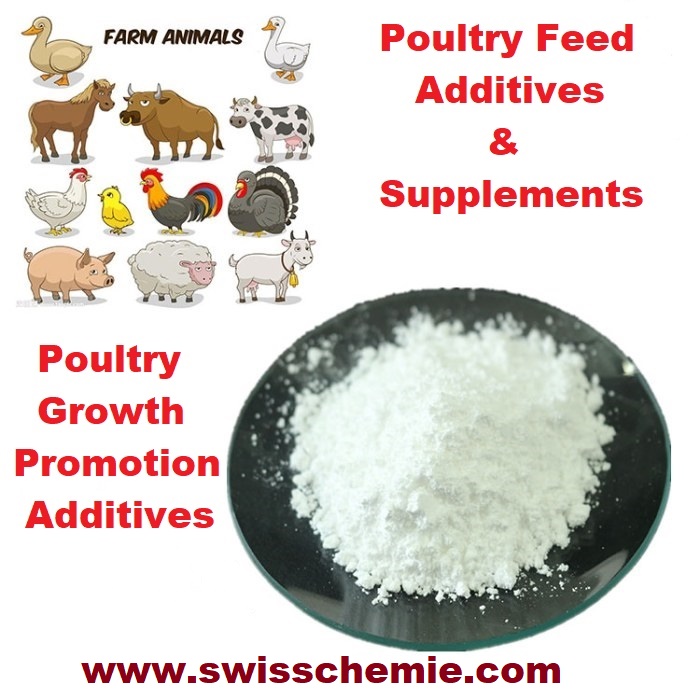
Poultry Feed Additive Supplements Supplier Exporters Manufacturer
29 / Jan 21
Feed additives are products used in animal nutrition for purposes of improving the quality of feed and the quality of food from animal origin, or to improve the animals' performance and health, e.g. providing enhanced digestibility of the feed materials.
Feed additives are non-nutritive products added to rations to improve the efficiency of animal production via an improvement in intake, digestion, and/or metabolism efficiency, and/or the health of the animal. Feed additives are added to the feed in small quantities.
Common feed additives used in poultry diets include antimicrobials, antioxidants, emulsifiers, binders, pH control agents and enzymes. Sometimes diets will also contain other additives used in diets for humans and pets such as flavor enhancers, artificial and nutritive sweeteners, colors, lubricants, etc. Each one of these additives there can be dozens of specific additives manufactured and distributed by a wide variety of companies. Again, all ingredients and additives must be noted on the label and their use and inclusion levels meet the standards as defined by law. In some instances additives are added to the animal’s diet in order to enhance their value for human consumption, but mostly this is accomplished by use of natural ingredients containing significantly higher levels of these nutrients that can be deposited directly into meat and eggs. This fact sheet will highlight a few important feed additives and their use in the poultry industry.
Swiss Chemie Market Specialty Chemicals For Veterinary Animal, Poultry Birds And Swine Health Industries.
For More Information And Price List Press Click

Types of Additives
Antibiotics - Acidifiers - Antioxidants - Vitamins - Minerals - Amino Acids - Binders - Enzymes
A variety of different feed additives are commonly used in poultry diets, or can be used when the need arises.
Antioxidants, Pelleting additives , Feeding enzymes, Mold inhibitors or mycotoxin binders, Coccidiostat, Antibiotics.
Poultry Growth Promotion Additives - Growth promoters are substances that are added to feeds as supplement or injection to improve feed utilization and the growth of farm animals. All non-nutrient feed additives such as antibiotics and exogenous enzymes that improve animal growth can be described as growth promoters.
Antimicrobials - Antimicrobials have been used extensively in intensive poultry operations to minimize disease and improve growth and feed utilization. However, the industry is currently evaluating alternatives to chemical therapeutics
Antioxidants in Poultry Nutrition and Reproduction - Commercial poultry production is associated with a range of stresses including environmental, technological, nutritional, and internal/biological. Indeed, it is practically impossible to avoid stresses, so therefore overproduction of free radicals and oxidative stress are very common problems in commercial poultry production. Natural antioxidants should, as a result, be included as an essential factor in poultry nutrition.
Acidifiers in Poultry Feed - Feed acidifiers are added to the feed to lower the pH of the feed and consequently the gut environment. A lower pH has the potential to inhibit or partly restrict the growth of pathogenic intestinal microbes. Acidifiers exist both as organic or inorganic acids or associated salts. They can exert their antimicrobial action both in the feed and throughout the gut. The use of acidifier complexes enables minimization of the development of pathogenic flora in feed and/or water and therefore optimizes digestive function by promoting beneficial acidophilus bacteria. Whether used in water, raw materials or feed, acidifiers ensure good support, circuit and animal hygiene.
Probiotics For Poultry Feed - Probiotics are defined as live mono or mixed culture of microorganisms which are non-pathogenic, resistant to gastric and bile acids, and when ingested can beneficially affect the host animal by improving the characteristics of intestinal microbiota. Probiotics, or beneficial bacteria, for chickens and other avian species are commonly added to poultry feed or drinking water in order to help support birds' health, performance and growth. This is particularly important in young animals in which stable intestinal bacteria have not yet been established.
Antibiotics in Poultry Feed Additive - Antibiotics are used to treat sick flocks. Most of the time, antibiotics are used in chicken feed to control a parasite. Maintaining gut health is important – if the chickens are healthy, they are going to grow better, but really, the farmers and companies are just trying to help the chickens be healthier.
Vaccines For Poultry Feed Additive - Poultry vaccines are widely applied to prevent and control contagious poultry diseases. Their use in poultry production is aimed at avoiding or minimizing the emergence of clinical disease at farm level, thus increasing production.
Poultry Feed Supplements Exporters, Poultry Feed Supplements Suppliers, Poultry Feed Supplements Manufacturer, Poultry Feed Additive Supplier United States Malaysia Argentina Vietnam, Poultry Feed Additive Supplier Mexico Japan Russia South Africa, Poultry Feed Additive Supplier Brazil Taiwan India Romania, Poultry Feed Additive Supplier South Korea United Kingdom New Zealand